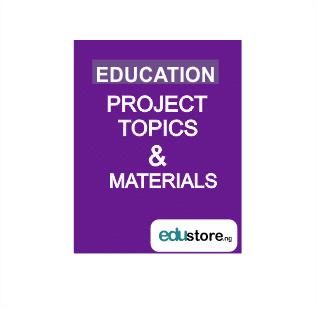CHAPTER ONE
INTRODUCTION
1.1 BACKGROUND OF THE STUDY
The Teaching of reading is at the centre of the academic objectives. At a wider level language by nature is an intricacy of learnings and relearnings which extends the communicative sphere. It wanders off the borders of linguistics even to involve almost every cognitive capability of man who is the only wielder of it. In it’s learning, it involves four skills namely listening and speaking on the one hand and reading and writing on the other. The reading skill is acquired, quite ironically, through it’s practice. However, in the face of a poor reading habit, teachers tend to focus on the material and make the child reread the passages severally so that what is achieved is a memorization of a particular passage.
The above shows a lack of the factors that go into the learning of reading especially the reading of a language that isn’t spoken at the public level and in a very good extent. But to properly understand the teaching of reading especially at the level of mass education which already poses the problem of a mass illiteracy, one needs to come to terms with all the factors that bear upon the learning of reading; factors that determine dexterity in it or the lack of it and at to what speed one is able to acquire this skill. These factors can be sociological, religious, politically motivated and so on but one can always tailor them down into two namely the home and school factors. A deep understanding of these two sources of the factors is what will determine the methodology of teaching reading in schools especially at secondary school level where the peculiar inadequacies begin to be seen.
1.2 STATEMENT OF THE PROBLEM
Often teachers feel frustrated at the learning speed of students especially at secondary school level where the entire curriculum is designed with the assumption that the students can read already. And even in the courses that are designed to augment the effort that has gone into teaching reading at junior secondary school level, attention are only paid to the reading materials yet they skill isn’t acquired by the students. This points to a conglomeration of factors out the given exercise. It is the investigation into these factors that has called upon the present research work which divides these factors into the home and school originated factors.
1.3 RESEARCH QUESTIONS
1.3.1 What are the home factors that bear upon the teaching of reading in junior secondary schools
1.3.2 What are the school factors that come into the teaching of reading in junior secondary school.
1.3.3 How can these factors be influenced to aid teaching and learning.
1.4 OBJECTIVES OF THE STUDY
The purpose of this study is to establish the various home and school factors that contribute to the teaching of reading in the junior secondary school of the department of mass education Gwagwalada college of education federal capital territory Abuja. It also aims at describing the processes and manifestations of these factors and to what extent they are relevant in the teaching of learning.
1.5 SIGNIFICANCE OF THE STUDY
This research throws great light on the guidance and counselling problem of child learning which often makes them turn recalcitrant whenever they seen unable to learn and the pressure from the teacher who is often feeling frustrated at the students inability to properly acquire this language skill. Which the manner in which this investigation is conducted, parents and teachers will be able to comfortably come together to eliminate the various factors on either environments in order to ease learning of reading.
The study significantly throws light on curriculum formulation so that post primary school education board can study the research and review the present curriculum on reading and the nature of materials to be prescribed for their level.
1.6 RESEARCH HYPOTHESIS
The investigation was build on the informed assumption that home and school factors actively bear upon the teaching of reading in junior secondary school of the department of mass education Gwagwalada FCT Abuja.
1.7 SCOPE OF THE STUDY
The study focuses on the factors as they are manifested in the department of mass education Gwagwalada FCT in the junior secondary section. The study is limited to only home and school factors that influence the teaching of reading and it establishes first the extent to which one can decide on a reading inadequacy. So that a mere mouthing of words in the course of reading is not considered fluency in reading at the level which this research is carried out.
1.8 LIMITATIONS OF THE STUDY
The major limiting factor of this research is resources to invest deeply in the study of the home factors that influence the teaching of reading in the said school. However, it was really the time factor that contributed immensely in that regard.
DOWNLOAD COMPLETE WORK- For Reference Only: Materials are for research, citation, and idea generation purposes and not for submission as your original final year project work.
- Avoid Plagiarism: Do not copy or submit this content as your own project. Doing so may result in academic consequences.
- Use as a Framework: This complete project research material should guide the development of your own final year project work.
- Academic Access: This platform is designed to reduce the stress of visiting school libraries by providing easy access to research materials.
- Institutional Support: Tertiary institutions encourage the review of previous academic works such as journals and theses.
- Open Education: The site is maintained through paid subscriptions to continue offering open access educational resources.





